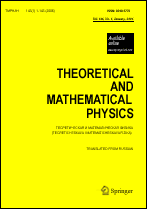|
This article is cited in 23 scientific papers (total in 23 papers)
Universally coupled massive gravity
J. B. Pittsab, W. C. Schievea
a University of Texas in Austin
b University of Notre Dame
Abstract:
We derive Einstein's equations from a linear theory in flat space–time using
free-field gauge invariance and universal coupling. The gravitational
potential can be either covariant or contravariant and of almost any density
weight. We adapt these results to yield universally coupled massive variants
of Einstein's equations, yielding two one-parameter families of distinct
theories with spin $2$ and spin $0$. The Freund–Maheshwari–Schonberg theory
is therefore not the unique universally coupled massive generalization of
Einstein's theory, although it is privileged in some respects. The theories
we derive are a subset of those found by Ogievetsky and Polubarinov by other
means. The question of positive energy, which continues to be discussed,
might be addressed numerically in spherical symmetry. We briefly comment on
the issue of causality with two observable metrics and the need for gauge
freedom and address some criticisms by Padmanabhan of field derivations of
Einstein-like equations along the way.
Keywords:
massive gravity, bimetric, ghost, positive mass, causality.
Received: 11.04.2006
Revised: 25.06.2006
Citation:
J. B. Pitts, W. C. Schieve, “Universally coupled massive gravity”, TMF, 151:2 (2007), 311–336; Theoret. and Math. Phys., 151:2 (2007), 700–717
Linking options:
https://www.mathnet.ru/eng/tmf6047https://doi.org/10.4213/tmf6047 https://www.mathnet.ru/eng/tmf/v151/i2/p311
|


|




 Contact us:
Contact us: Terms of Use
Terms of Use
 Registration to the website
Registration to the website Logotypes
Logotypes







 Citation in format
Citation in format 
